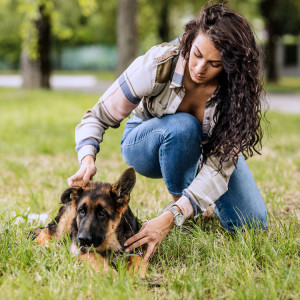How to Tell If Your Dog Is Sick
Look out for these warnings signs so you know when to call the vet.

Share Article
In This Article:
How to Check If My Dog Is Sick Common Signs of Sickness in Dogs Common Illnesses for Dogs What Signs Indicate My Dog Is Seriously Ill? When Should I Take My Dog To The Emergency Vet? Tips for Handling a Sick Dog
Pay close attention to your dog’s health by watching for changes like lethargy, loss of appetite, or signs of pain. Also, be alert to symptoms such as vomiting or diarrhea, as they may indicate your dog is unwell and requires prompt veterinary care.
How to check if your dog is sick
If you’ve ever wondered, How do I know if my dog is sick? you’re not alone. They don’t hand you a doggie translation book when you become a dog parent, and dogs aren’t always the best about letting you know what’s going on with them. While some dogs seem to enjoy playing up every minor injury for sympathy and cuddles, others would ignore a broken leg to not miss out on a trip to the dog park.
The basic truth is that you will often know something is off with your dog before anyone else. You’re with your dog every day and know their normal behavior and routines best. Illnesses can make your dog act differently than normal, but careful observation is often needed to pinpoint what is going wrong.

Common signs of sickness in dogs
Watching your dog for signs of illness will enable you to provide your veterinarian with helpful information and allow you to monitor for signs of improvement. Common symptoms that sick dogs show include:
1. Vomiting
Vomiting can obviously be a sign of stomach upset, but it could also indicate issues in other organs. Many diseases cause vomiting in dogs.
2. Major changes in urination
A change in the frequency of urination or a noticeable increase or decrease in the amount of urine could indicate a bladder issue, dehydration, a metabolic issue, or problems with the liver or kidneys.
3. Loss of appetite
Sick dogs often avoid food or don’t finish meals. This is sometimes caused by nausea, but it can be due to pain or general malaise.
4. Major changes in weight
A decrease in weight is a very common sign of illness and can even occur in dogs who still have a great appetite. Weight gain can be a sign of illness as well, either due to decreased metabolism or increased fluid retention.
5. Respiratory problems
Symptoms like labored breathing, coughing, or nasal discharge can indicate a variety of respiratory issues. Some respiratory issues can be contagious to other dogs.
6. Diarrhea
Diarrhea can indicate a problem with the GI tract, or it could be due to another disease entirely. Dogs who go to the bathroom in the yard without supervision may have diarrhea for some time without their parents noticing.
7. Change in odor
A sudden change in your dog’s normal smell could indicate a problem with their teeth, skin, or ears. This is especially true if it persists after a bath.
8. Increased thirst
If you notice that you’re needing to refill your dog’s water more frequently or that your dog is always hanging around the bowl, it could indicate that they’re drinking more. Changes in thirst often accompany changes in urination.
9. Change in gum color
A dog’s gums should be a bright bubble-gum pink color. Gums that are pale, bluish, grayish, brick red, or brownish can be a sign of illness. Some dogs have pigmented gums, making it difficult to check for this.
10. Pain
Whimpering, whining, trembling, and avoiding contact can all be signs of pain in dogs. Always be careful when a dog is in pain, they can strike out and try to bite as a protective response, even if they’re very familiar with you.
11. Lethargy
Lethargy is a non-specific symptom, but very noticeable. Dogs who are sick often retreat to a safe space and stop interacting with their family.
12. Significant change in body temperature
A dog’s temperature is normally in the 100.5 degrees Fahrenheit to 102.5 degrees Fahrenheit (38 degrees Celsius to 39.2 degrees Celsius) range. Dogs can develop a decreased or increased body temperature when they are sick.
What are common illnesses for dogs?
If you’re worried that your dog is sick, you want to know what’s causing it so your pup can start feeling better. Your veterinarian can help diagnose the cause for your dog’s illness, but it never hurts to have some general ideas about the types of problems that dogs can get beforehand. Some of the most common illnesses that make dogs act sick include:
Stomach upset: Dogs can have gastrointestinal upset for a variety of reasons, but eating something out of the norm is one of the most common causes for a dog to develop vomiting, diarrhea, and loss of appetite.
Urinary issues: Urinary tract infections and bladder stones are some of the most common conditions that cause urinary changes in dogs.
Respiratory infections: Kennel cough is a catch-all term for most contagious respiratory diseases in dogs. Most dogs with kennel cough bounce back to normal after a week or so, but some can develop complications like pneumonia.
Organ diseases: Problems with a dog’s liver, kidneys, heart, or other organs can make them feel sick. Many of these problems have a very gradual onset, so it’s easy to miss the symptoms until there’s a crisis.
Poisonings: Dogs love getting into things they shouldn’t and aren’t the most discerning eaters. They’ll gladly eat things that are toxic to them like grapes, rat bait, medications, and chocolate.
Metabolic problems: Diseases like hypothyroidism, diabetes mellitus, Cushing’s disease, and Addison’s disease are relatively common in dogs. They can cause changes in weight, urination, activity, and organ function.
What signs indicate my dog is seriously ill?
Sometimes your dog won’t be subtle about their illness, and they’ll set off alarm bells that let you know there’s a problem. Some of the signs that your dog is very sick include:
Rapidly enlarging belly
Inability to urinate
Bloody diarrhea
Pale gums
Labored breathing
Inability to stand
Evidence of trauma (open wounds, broken limbs, bleeding)
Hypothermia or fever: temperature higher than 98 degrees Fahrenheit (36.7 degrees Celsius) or higher than 103.5 degrees Fahrenheit (39.7 degrees Celsius)
Severe pain
When should I take my dog to the emergency vet?
The above symptoms are good indicators of a serious problem, but it’s impossible to list every sign that could indicate a dog is very sick. Always take your dog for emergency care if you note any of those signs, but you should use your instincts and judgment as well. If you’re worried your dog isn’t feeling well, contact an emergency vet’s office or take them in for evaluation. It’s better to be safe and get them checked out for a minor problem than to miss a major problem that could have been caught earlier.
You should also seek emergency care if you know or suspect your dog ingested something toxic or non-digestible. Few things make an emergency vet happier than making a dog vomit up something they shouldn’t have eaten before it can cause serious harm.
Tips for handling a sick dog
Sick dogs should be handled gently, especially if they’re in pain. Don’t make sudden motions or poke and prod them to try to find out what’s wrong. You may need to pick them up wrapped in a cozy blanket to keep them comfortable while getting into and out of the car. Sick dogs may also need to have their activity restricted to limited indoor areas. Try to provide a safe, quiet place for your dog to rest. Accompany them on trips outside so you can keep an eye on them and observe their urination and defecation.
When dogs are feeling sick, it’s tempting to try to spoil them with extra care, often in the form of tasty food. If your dog isn’t eating, don’t try to tempt them with human food and extra snacks — these can often cause stomach upset and make things worse. Make sure your dog has water freely available and discuss what diet is appropriate with your veterinarian.
FAQs (People also ask):
What is the best way to share my dog’s health history?
You can create a document with the dates and types of previous major health events and known conditions. For an acute illness, make a list of symptoms, when they started, and any recent events that could have caused a problem.
What should I do when my dog is sick?
If you’re worried that your dog is sick, contact your veterinarian as soon as possible. Letting them know your dog’s symptoms and overall condition will help them guide you on the next steps to take.
How can I tell if my dog is depressed?
Depression in dogs is not commonly diagnosed. Dogs may show a disinterest in their favorite activities, but this can happen when they’re sick, too. Rule out medical issues with your vet before considering depression as a cause.

Dr. Bartley Harrison, DVM
Dr. Bartley Harrison is a veterinarian with more than 19 years of experience. He has treated a variety of species in emergency and speciality practices for both large and small animals. His primary interests as a vet are emergency medicine and critical care.
Related articles
![man and lab puppy on park road]()
When, Exactly, Should You Vaccinate Your Puppy?
If it’s time for a round of shots (no, not that kind), follow this guide.
![French bulldog puppy looking scared at vet]()
10 Things to Ask at Your First Vet Visit
There are no stupid questions — well, when it comes to your dog’s health.
![cat and dog laying on bed together]()
What’s the Deal With Pet Insurance?
It covers your pet so you can get that broken leg fixed—while keeping your wallet happy.
![black and white dog looking ill laying on couch]()
Warning Signs Your Dog Needs to Go to the ER — Stat
Trust me, I’m a vet.
![brown dog begging for food at table]()
Foods Your Dog Can’t Eat
Even if they aren’t too proud to beg, you shouldn’t let your pup in on these snacks.
![Young woman comforting German Shepherd puppy outside.]()
My Dog Is Pooping Blood: What Should I Do?
It’s an alarming sight, but here’s what you should know.










